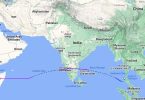‘Community’. It is a word that has taken on a number of new meanings since the advent of the social media age.
A word of Latin origin (‘communis’ – things held in common), and once simply referring to the collection of people of shared physical space and shared values – local community, national community, global community – the arrival of the internet age has eliminated the element of physical space as part of the definition. Today ‘community’ is simply the coming together of people of like mind, interest, beliefs, and vision. While change has occurred in the ‘where’ of how members of a community may be connected, the sharing of what is most important remains the same.
What has also not changed is the desire of communities across the globe to welcome people in. Combining the elements of people and place, the travel sector is celebrated as a beyond-the-internet way for people of shared interest and appreciation to come together.
As the tourism sector steadily raced past the 1 billion international arrivals mark in 2012 (1.087 billion in 2013), and as it continues to exhibit inspiring growth, travelers of the world have become more and more appreciative of the opportunity that travel & tourism affords them to make meaningful connections with the places they travel. Community has become a compelling reason to visit, and a competitive advantage for destinations.
For those within the tourism world, the word ‘community’ has established a high level of meaning and appreciation as both a noun and a verb, including becoming a statement of the fundamental participants and benefactors of the sector itself – the ultimate stakeholders. With that, ‘community’ has become part of the sustainability equation, community development a vital input and output.
The above paragraph, in many ways, tells tourism leaders across the globe what they know, in their minds and in their master plans. And yet, because of the frequency (and possibly overuse) of many terms central to the advancement of the sector, terms such as ‘sustainability’, ‘empowerment’ and ‘community’, this knowing suffers a break in connection between the head and the heart. Indirectly, through strategies, SWOT analysis, and statements of vision, mission and values we know that community matters. We know the people of tourism matter. We know that developing the sector in a way that makes locals feel a part of its delivery and development is the right thing to do.
PAUSING TO APPRECIATE AND ACCELERATE IMPACT
But do we ever really pause to explore, directly, if, how, where and why community development is such an important part of tourism growth for nations, businesses and societies?
Sadly, such pauses dissolve amidst the busyness of everyday business.
For this reason, in 2014 the UNWTO is utilizing September 27, its annual UN-allocated day of celebration and awareness building, to draw attention to the matter of ‘Tourism & Community Development’.
As expressed by Dr. Taleb Rifai, Secretary General of the UNWTO:
“World Tourism Day highlights foremost the transformative role of tourism and its social, political, cultural and economic relevance in the world today. Each time we travel, use local transport at a destination or buy local products from a small producers local market, we are contributing to a long value chain that creates jobs, provides livelihoods, empowers local communities, and ultimately brings in new opportunities for a better future.
“The theme of World Tourism Day 2014 – Tourism and Community Development – brings to the forefront the potential that tourism has to promote new socio-economic opportunities and better livelihoods for communities around the world while highlighting the critical role that community engagement has in advancing sustainable development. This year’s message emphasizes how tourism can be integral to advancing sustainable development from the grassroots level.”
But why this issue, and why now? Dr. Rifai’s tone intensifies as he makes his point:
“The theme could not be more relevant at this moment when international tourism is experiencing such a rapid and exponential growth. There needs to be a fundamental shift in understanding the responsibility and benefits emerging from enhancing community development in tourism.
“But it is not just the responsibility of government. Private enterprises, just like the public sector and civil society, have a critical role to play in ensuring that tourism grows sustainably in communities. Private tourism businesses must embrace sustainability in their operations to ensure viable, long-term economic operations that provide for stable employment, income-earning opportunities and social services for host communities.”
COMMUNITY DEVELOPMENT THROUGH COMMUNITY PARTICIPATION
One often overlooked yet critical dimension of community development in tourism is the pure source of employment, skills training, identity building and opportunity creation that comes through involving local communities in the industry. Through employment, communities are able to seed themselves into the traveler experience, bringing local community warmth, character, style, and, a term sadly now over traded – authenticity, to the destination offering.
Community development through tourism is, in many ways. An insurance policy for destinations, keeping it real so that the destination can keep the offering personal, compelling and competitive.
Still, while being such a force within tourism, this essential aspect of tourism development often goes unapplauded and under nurtured. Why? Because it is invisible.
For this reason, the UNWTO has always sought to put faces and voices to the communities supporting tourism across the globe as the sector’s critical workforce, participating in experience delivery each and every day, as a way of creating a livelihood for themselves, and a future for their families and communities.
As expressed by Dr. Rifai:
“At the heart of the transformative movement of global tourism are all those who, each and every day, wake up and commit their energies to playing an active, meaningful part in tourism. Chefs, innkeepers, artisans, taxi drivers, shopkeepers, bakers, growers, traders, guides, and millions of others work with pride, purpose and a sense of optimism.
“These are the people who bring such meaning to our efforts to grow the tourism sector. These are the lives who depend on our fulfilling our promise to ensure that economic growth and development through tourism is people-centered and genuinely sustainable in the way that it impacts their daily lives.”
With over 265 million people across the world working each day to support the sector, as a way of creating a personal connection to the faces and voices from within our industry, in 2013 the UNWTO launched “Tourism Stories: How Tourism Enriched My Life” – the first in a series of books focusing on some of the people and communities working within the industry. Please download your free copy at: http://www.e-unwto.org/content/v32763/ ”
As World Tourism Day is celebrated by the global tourism community on September 27th, at the heart of this year’s celebrations is a profound truism known by tourism leaders and tourists alike, and as perfectly stated by Dr. Rifai:
“There can be no real tourism development if such development damages in any way the values and the culture of host communities or if the socio-economic benefits generated by the tourism sector do not trickle down to the community level.”






















